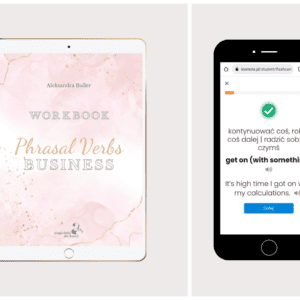Transcript of my podcast episode (42)
Hi, dears! This is ENGSPRESSO episode no. 42, and I’m glad you can hear me again! How have you been? Have you been enjoying the weather lately? Have you had any holidays yet?
I came back from my short holiday in Corfu about three weeks ago, and I must say the weather there was very similar to the one we had in Poland at that time. But of course, you can’t compare our Baltic Sea with the Ionian Sea, which is generally much warmer and has beautiful shades of blue. I love our Polish seaside too, but in April, I really longed to spend some time in a different country, and Corfu was a good choice, especially in the off-season. It was still very quiet there, and sometimes I had the entire beach for myself, so I was the happiest! The town centre, however, was already full of tourists, so I can’t imagine going there in high season. I’m not big on crowds, noise, or high temperatures. I can’t really charge my batteries in places that are chock-a-block with tourists. I need some peace and quiet to relax. How about you? Do you enjoy calm places like me, or are you keen on spending time e.g. in vibrant cities with lots of entertainment? You can tell me about it in the comments under this ENGSPRESSO episode. Although I can’t reply to you on Spotify, I do read all of your comments, and you will know that I’ve read your comment once it’s published and visible in the comment section. So go ahead and write to me in English!
And now it’s time to teach you another two expressions!
The first one is COMMON SENSE. Common sense is the basic level of practical knowledge and judgment that we all need to help us live in a reasonable and safe way. Sounds complicated? Don’t worry – you’ll get it right away!
For instance: It’s just common sense to look both ways before crossing the street. Now, repeat after me.
The translation is: To po prostu zdroworozsądkowe (dosł. to po prostu zdrowy rozsądek), żeby spojrzeć w obie strony zanim przejdzie się przez ulicę.
Another example: If he had used a bit of common sense, he would have avoided that accident.
Gdyby zachował odrobinę zdrowego rozsądku, uniknąłby tego wypadku.
The second expression is TO DO STH FROM SCRATCH. When you do or start something from scratch, you do it from the beginning, without using anything that already exists.
For instance: Save your file before restarting the computer; otherwise, you’ll have to write your essay from scratch.
Zapisz plik przed ponownym uruchomieniem komputera; w przeciwnym razie będziesz musiał pisać swój esej od początku.
Another example: Although a wave destroyed their beautiful sandcastle, our children didn’t mind building it from scratch.
Mimo że fala zniszczyła ich piękny zamek z piasku, nasze dzieci nie miały nic przeciwko zbudowaniu go od początku.
And now it’s time for your ENGSPRESSO to go!
Our context for the phrases is:
Let’s approach the situation with common sense: losing your job doesn’t mean starting everything from scratch – you’re still an expert in this line of work!
Podejdźmy do tej sytuacji ze zdrowym rozsądkiem: utrata pracy nie oznacza zaczynania wszystkiego od początku – wciąż jesteś ekspertem w tej branży!
Great! Did you manage to repeat all the sentences after me? I hope so! I encourage you to listen to this episode once again, or even a few times, so that you can get more confident and repeat the phrases faster. Moreover, if you’d like to revise all the English expressions we’ve had so far in our episodes, make sure you check out my ENGSPRESSO flashcard course online that’s available in the shop on my website angielskidokawy.pl.
Of course, you can also have a look at the transcript of today’s ENGSPRESSO. You’ll find it in the description of the episode or directly on my website.
And last but not least, let me remind you that I run individual, conversational lessons for women starting from level B1, so if you’d like to take part in them, feel free to send me an e-mail or a message on Instagram or Facebook.
Thanks for your time and speak to you soon!
Wyświetlanie 1–9 z 14 wynikówPosortowane według najnowszych
-

245 IDIOMÓW, PRZYSŁÓW I POWIEDZEŃ (part 2) – kurs online
45,00zł Dodaj do koszyka -

ENGSPRESSO – kurs online
35,00zł Dodaj do koszyka -

Transkrypcja odcinków ENGSPRESSO (1-30) – e-book
25,00zł Dodaj do koszyka -

IRREGULAR VERBS (Past Simple & Present Perfect) – kurs online A2-B1
45,00zł Dodaj do koszyka -

KURS DO KAWY B1-B2: powtarzaj za mną! – kurs audio
45,00zł Dodaj do koszyka -

ENGSPRESSO workbook 1 – e-book
55,00zł Dodaj do koszyka -

Rozmowa Kontrolowana Na Próbę
170,00zł Dowiedz się więcej -

PONAD 200 PRAKTYCZNYCH WYRAŻEŃ B1-B2 – kurs online
55,00zł Dodaj do koszyka -

PHRASAL VERBS BUSINESS – PAKIET e-book + kurs online
75,00zł Dodaj do koszyka




